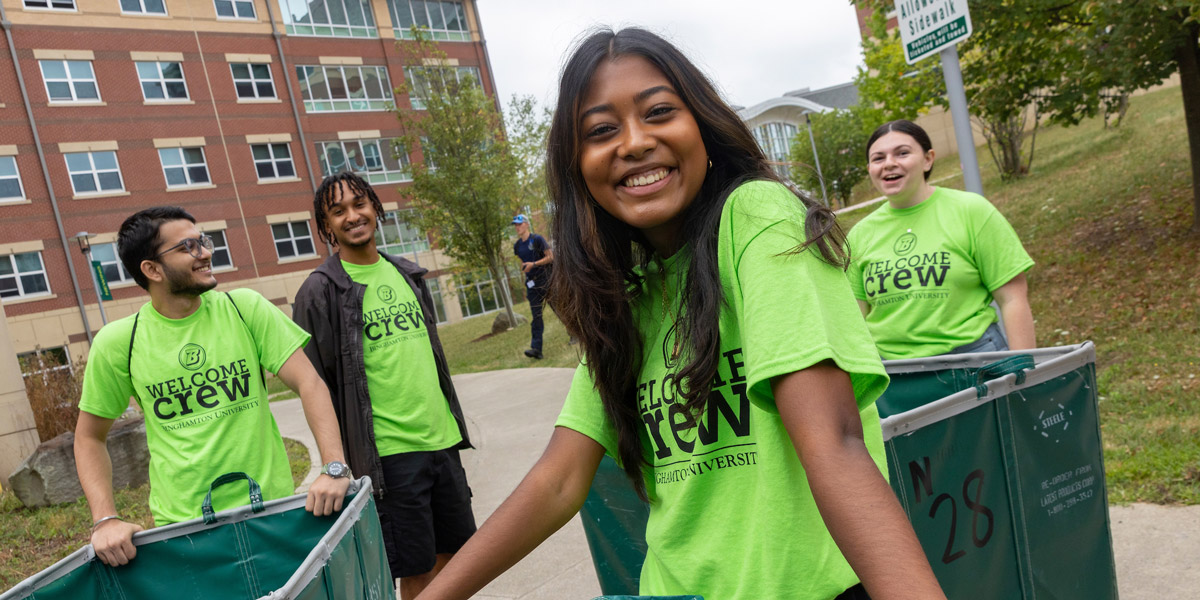New Residential Life staffing model to increase opportunities, relieve workload
300 new paid positions created to support students

Binghamton University Residential Life will transition to a new expanded student staffing model beginning in the fall of 2023.
The support services offered and expected in residential life programs have continuously expanded, and the expectations placed on residential assistants (RAs) have compounded over the decades in reflection of this growth.
“In years of exit interviews, we’ve consistently heard from our student staff that the scope of the RA position has become unmanageable,” said Paola Mignone, assistant vice president for residential experiences and auxiliaries. “RAs are expected to build community, plan and market events, mediate roommate disputes, monitor for health and safety concerns, report maintenance issues, counsel their peers, develop traditions and more. Any time a residential student has a problem of any variety, they go to their RA first.”
The RA role as developed in the 1960s is not well-adapted to supporting all of the current initiatives aimed at ensuring student success and well-being. Neither are the current expectations a reasonable amount of responsibility to place on an undergraduate student. As a result, residential life program leaders across the country are engaging in an ongoing national conversation centered on developing new models for involving student staff in residence halls.
After reviewing data about demand for services, reviewing feedback from student and professional staff, and speaking with peers across campus (the Financial Aid Office; Dean of Students CARE Team; Fleishman Center for Career and Professional Development; Division of Diversity, Equity and Inclusion; and many others), Director of Residential Life Casey Wall and her team have developed a student staffing model that will add 300 new paid student jobs in addition to reimagining the roles of the current 200 RAs. The new positions will directly support students in the residential communities. Wall expects this framework will more readily allow for future adjustments and improvements based on student and staff feedback and — most importantly — evolving student needs.
“We know there are many different responsibilities in the current RA position, including some that individual staff members aren’t fond of,” said Wall. “But the thing one student dislikes may be exactly the type of experience another student is looking for. This new model actually allows for more students to apply for jobs in Residential Life, and those positions will better fit their interests and skill set, while giving them a more powerful learning experience. It also expands the number of students involved in the programs and services of our residential communities.”
Two new positions will continue to maintain a physical presence in the lower campus residential communities and receive housing for their service. These positions have two main focuses. Student support assistants will have on-call hours and aid in overall student well-being, providing conflict resolution support, encouraging participation in co-rec sports and activities within the residential communities, and referring students to University resources as needed.
Student community assistants will focus on bringing students together — connecting first-year students with campus opportunities and resources through intentional individual conversations, producing a welcoming environment in the halls and implementing area-wide traditions.
The 300 new student positions will be broken up into a variety of different roles: student area assistants (dealing with lockouts, developing bulletin boards and newsletters, etc.), student operations assistants (completing health and safety inspections, following up on work orders, etc.) and student marketing assistants (developing advertising for events, managing social media accounts, etc.).
There will also continue to be paid opportunities at the beginning of each semester with the B-Welcome Crew, and a newly imagined See Ya Later Crew will provide an additional paid opportunity at the end of each semester. Both roles will relieve some of the additional pressure a traditional RA would have felt at already stressful times of the year. Residential Life also has, and will continue to employ, student resource managers who manage buildings and programmatic spaces.
When the new staffing model goes into effect in August 2023, students who served as RAs during the 2022–23 academic year and who continue on staff will receive the same benefits they had previously through graduation, even though their roles and duties will change to align with the new structure.
“Our residential communities have always been more than a place to eat and sleep,” said Wall. “They’re where students make friends, have fun and build important life skills. And as time goes on and students’ needs change, it’s our job to adapt and make sure they’re also a place where students can find meaningful experiences centered around engagement and support.”
